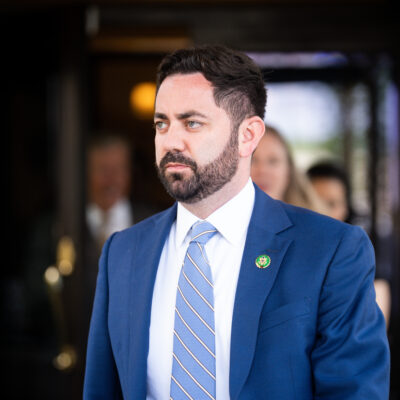Senators Demand Action on Palestinian Terror Payments
WASHINGTON – Republican and Democratic lawmakers called for a dramatic reduction in U.S. aid to the Palestinian Authority (PA) at a Senate Foreign Relations Committee hearing on Wednesday. The session focused on the Taylor Force Act, legislation that would cease American economic aid to the PA if payments to terrorist families do not end. “To me, this legislation is an absolute no brainer. I’d go much further than this,” said Senator James Risch (R-ID). “This thing has been going on for decades and decades. We are getting nothing for this but business as usual.”
Senator Lindsey Graham (R-SC), who introduced the bill in February, spoke at the beginning of the packed hearing and praised the efforts of Taylor Force’s father, Stuart Force, who also attended the session. Taylor Force was a West Point graduate who served in the US military before being killed by a Palestinian terrorist while participating in a study abroad program in Israel last year.
Elliott Abrams, who served in several senior administration positions for Presidents Ronald Reagan and George W. Bush, testified in favor of the bill while former U.S. Ambassador to Israel (2011-2017) Daniel Shapiro, urged the bill to be amended. Shapiro did however back the legislation’s ultimate goals of ending the controversial payments.
The independent-minded Republican Senator from Kentucky, Rand Paul, expressed his support for the legislation. He noted how in 2014 he sponsored S. 2665 that would have also cut off U.S. assistance to the PA, but “the chairman (Bob Corker, R-TN) blocked me at the time.” The Kentucky lawmaker added, “People sense weakness. Cut it all. Cut every last penny of it. Restart it when they (PA) change their behavior.”
Responding to Paul’s charge, Corker emphasized, “Please remember also the reason I opposed bringing it to the floor at that time is the Israeli government — who it is we are trying to help here — was strongly opposed” to the bill.
In response to a suggestion by Senator Jeff Merkley (D-OR) about possibly shifting the U.S. assistance from PA funding to non-governmental organizations or peace projects, Abrams expressed skepticism. “If the penalty for spending money on terrorists is well it goes from box one to box two, that’s not much of a penalty. I think Palestinians need to be told: this has got to stop.”
Paul suggested that it’s up to Israeli lawmakers to take the first step. “If the Knesset can’t even withhold the tax money… what kind of message are we sending? If the Knesset is listening to us, for goodness sake you have got to do at least that first step.” The Knesset has in fact introduced legislation similar to the Taylor Force Act. However, the bill requires additional three readings before it becomes law.
One proposal floated by Shapiro was to add a national security waiver — similar with the six-month waiver on moving the U.S. Embassy from Tel Aviv to Jerusalem — that would allow President Donald Trump to waive the requirement of cutting off aid if viewed as appropriate.
The Taylor Force Act would actually cut $50 million to Israel since the PA spends some of the US assistance on debt repayments to Israel, Corker emphasized. The committee Chairman added that based on a conversation he had with Israeli Ambassador to the U.S. Ron Dermer, Jerusalem still supports the proposal.
Senator Chris Coons (D-DE) raised the concern that the language of the bill as written could prevent Washington from providing humanitarian aid to the Gaza Strip should there be another outbreak of violence. Shapiro agreed with Coons that flexibility in the legislation is critical to allow the U.S. to offer emergency humanitarian aid given the three wars in Gaza since 2009.
During his time as U.S. Ambassador, Shapiro noted that senior Israeli military officers cautioned against significant reduction in foreign assistance to Ramallah due to the fear of the PA’s collapse and the impact such an event could have on Israeli security.
Ranking Democrat Ben Cardin (D-MD) expressed disappointment during his opening statement that no representative of the Trump administration was present at the hearing to offer the executive branch’s view on this legislation.
While the Republican Jewish Coalition (RJC) has actively promoted the bill, AIPAC has mostly remained mum and did not post about the Taylor Force Act on social media Wednesday.
Corker has called for the passage of a “Taylor Force like Act” by the August recess signaling urgency for the legislation.






